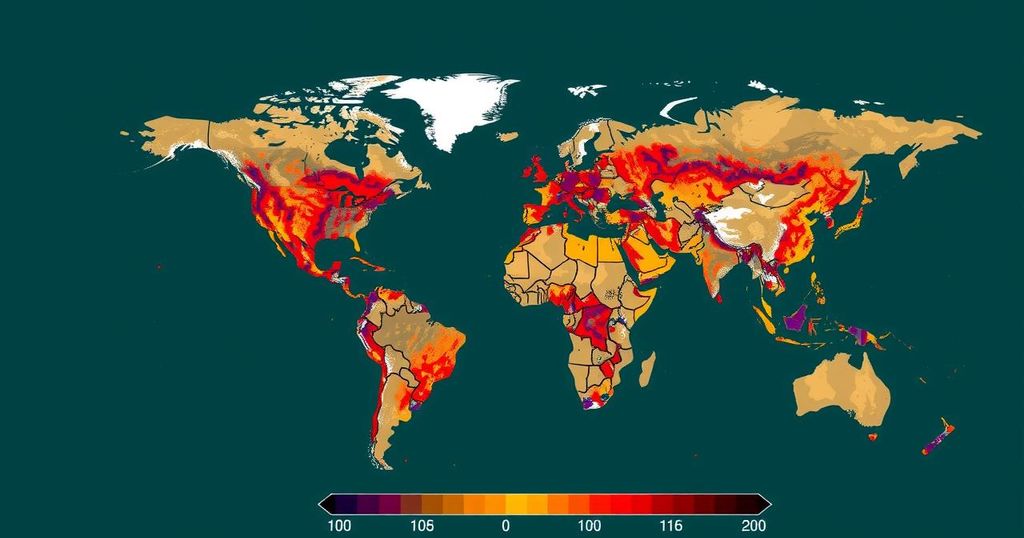Impact of Climate Change on the Spread of Dengue Fever
Rising global temperatures are linked to increasing rates of dengue fever, a mosquito-borne illness that can cause severe health issues or death. A study indicates that climate change is responsible for nearly 20% of worldwide dengue cases, potentially tripling by 2050 without emission reductions. The analysis of 1.5 million cases reveals temperature conditions favoring the Aedes aegypti mosquito, highlighting urgent action needed to mitigate both climate change and dengue transmission.
Rising global temperatures significantly exacerbate the spread of dengue fever, a mosquito-transmitted disease responsible for severe health complications and mortality. A comprehensive study has identified that approximately 20% of global dengue infections can be attributed to climate change, with projections suggesting that this figure may triple by the year 2050 if greenhouse gas emissions persist unchecked. The analysis encompassed around 1.5 million dengue fever cases from 21 countries predominantly situated in Asia and the Americas, regions where the disease is endemic. The researchers observed that increasing temperatures foster optimal conditions for the Aedes aegypti mosquito, responsible for dengue transmission. Elevated temperatures accelerate both the mosquito’s reproduction and the replication of the virus within the mosquito, thus enhancing the rate of transmission. The study identifies a specific temperature threshold of approximately 84°F (29°C), where the transmission rates of dengue fever peak. This warming phenomenon raises substantial concerns for countries such as Peru, Mexico, and Brazil, where optimal temperature ranges for dengue transmission are becoming increasingly common. In these regions, dengue infections could possibly increase by more than 150% in forthcoming decades. Conversely, in extremely hot regions like southern Vietnam, mosquito populations may decline due to excessively high temperatures exceeding 86°F (30°C), which negatively affects their lifespans. Public health officials express alarm regarding the intersection of rising global temperatures and increased international travel, which could significantly hasten dengue’s spread into temperate regions. Initiatives aimed at combating this looming threat necessitate substantial reductions in carbon emissions to alleviate global warming, with estimates suggesting that such actions could thwart millions of future dengue cases. In addition, controlling mosquito breeding sites and bolstering public health responses are pivotal for effective prevention. Urbanization, poverty, and deforestation exacerbate conditions suitable for mosquito proliferation, particularly in areas lacking adequate sanitation facilities. Innovative approaches, such as the introduction of Wolbachia bacteria into mosquito populations—a method proven to notably diminish dengue transmission in Brazil—offer promising avenues for intervention. Nevertheless, these strategies require time and unwavering commitment for sustainable success. Experts assert that countering the spread of dengue must be integrated within broader climate mitigation efforts, focusing on the safeguarding of vulnerable populations and enhancement of healthcare systems. As climate change continues to advance, straightforward interventions such as wearing protective clothing and utilizing insect repellents can aid individuals in evading dengue infections. The increasing incidence of dengue globally emphasizes the critical connection between climate change and public health, highlighting an urgent call for robust environmental and health-related interventions.
Dengue fever is a viral illness transmitted by Aedes mosquitoes, primarily Aedes aegypti. The disease is endemic in tropical and subtropical regions, posing significant health risks. With climate change altering environmental conditions, studies are revealing direct correlations between rising temperatures and the proliferation of mosquito populations, influencing transmission rates of dengue. Recent research indicates that as climate change progresses, the impact of temperature increases on dengue transmission is likely to intensify, stressing the urgency for preventative measures and public health strategies to combat this challenge.
This article elucidates the alarming connection between climate change and the propagation of dengue fever. As global temperatures continue to rise, the potential for increased dengue transmission heightens, particularly in vulnerable regions. The implications of this public health crisis demand immediate action, encompassing both environmental efforts to reduce greenhouse gas emissions and comprehensive public health strategies to manage mosquito populations. With appropriate interventions and community preparedness, the transmission of dengue may be controlled, protecting individuals and societies from this significant health threat.
Original Source: www.natureworldnews.com




Post Comment